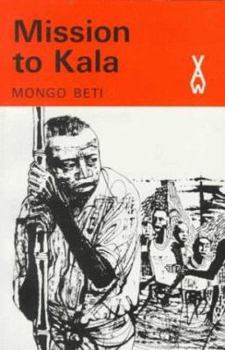Mission to Kala
Select Format
Select Condition 
Book Overview
Medza is sent off to retrieve a villager's wife who has run off with a man from another tribe.
Format:Paperback
Language:English
ISBN:0435900137
ISBN13:9780435900137
Release Date:January 1982
Publisher:Heinemann Educational Books
Length:183 Pages
Weight:0.32 lbs.
Dimensions:0.5" x 4.7" x 7.3"
Customer Reviews
2 ratings
Second generation
Published by Thriftbooks.com User , 21 years ago
Failing his exams, the hero of this tale, embarassed and forlorn, returning in shame to his village in the Southern Cameroons, dreading an encounter with his ambitious and domineering father, has the good fortune of being sent to the upcountry, Kala, to effect the return of a fellow-villager's wife. Negotiations with the man's father-in-law had not been successful, and Niam needed his wife to return to farm his crops. In the upcountry, Jean-Marie Medza's relatives honor him because he is a city man and he is educated. In the course of talking about geography and other matters learned in college, he becomes all too aware of the gaps in his knowledge. He thinks, why should boys be tortured learning things only half-known by their teachers, things such as the conditions in Russia.Medza stays with his cousin Zambo and Zambo's parents. Zambo's father, the uncle, is a furniture-maker and farms along with everyone else. Cocoa is near the settlement and the other crops of ground nuts, yams, bananas, manioc are planted as far away as possible to leave room for the cocoa-plantations to be extended. Over time the uncle takes charge of the social calendar of Medza, a popular guest. After the visits presents arrive. The older people send sheep, the younger ones chickens. Medza divides the livestock with his uncle pursuant to their blood-kinship. The description of how the village lays seige to him in a social sense is comical. Young boys wanted to be taught, girls entertained, people his own age cavorted with him afternoons, and the elderly surrounded him in the evenings. The older people had more resources in this traditional society and so were able to claim the greater share of Medza's attention. Kala was a large village, and so Medza could have spent the greater part of a year dining from hut to hut. In the fourth week of the visit things come to a head. Niam's wife shows up in the company of a man with whom she had been living. (She knew that Jean-Marie had been looking for her.) Brought before the chief, the fine for adultery is imposed, two thousand francs or four healthy rams or two ewes. Jean-Marie is instructed to take Niam's wife home with him, but before that there is to be a party at the chief's residence. During the party Jean-Marie marries the chief's daughter, Edima. Afterwards he fears the reaction of his father to his new state of matrimony.He returns home. His uncle is to follow with his flock, Naim's wife, and his own wife. Jean-Marie describes his father as a case of western hypocrisy and commercial materialism grafted onto an African intelligence. After his wife arrives along with the others from Kala, Jean-Marie and his father have a terrible fight. He and his cousin Zambo depart, and although the following October Jean-Marie passes his exams and gets a job, he never returns for his wife. The book is very strong, very interesting. The story is told simply and effectively.
The growing pains of a society in transition
Published by Thriftbooks.com User , 21 years ago
By golly! I am glad I read this book, and will surely read it again. Mongo Beti has captured so well what any person who has spent considerable time in a Cameroonian village will only be lucky, perhaps, to see today. The attitudes of the local people towards western ideas and education, the genesis of what has become a bona fide inferiority complex of the locals vis-a-vis the white man and his ideas are vividly portrayed by a master storyteller. A failed western scholar, Medza, is paraded as a hero by the locals, even as he himself sees more worthy heroes among those who pay him court. But he is not unwilling, and in fact is quite happy, to accept the undeserved accolades, and to profit from it as much as he could even as every instinct in him fights the imorality of his decisions. In the final analysis, Medza, our hero, is the embodiment of the "educated" elite that has led Cameroon since independence--an elite aptly incapable of leading the a local populace whose ideals and ideas they have been trained to despise. But in the end one has a certain sympathy for Medza. He has only wanted to do the right thing but has been caught between what his heart wants--a trully idealic traditional village way of life, and the idiosyncracies of a dictatorial father who wants to make a black whiteman out of him. Why do I feel sorry for him then? Because his is a story I understand.





